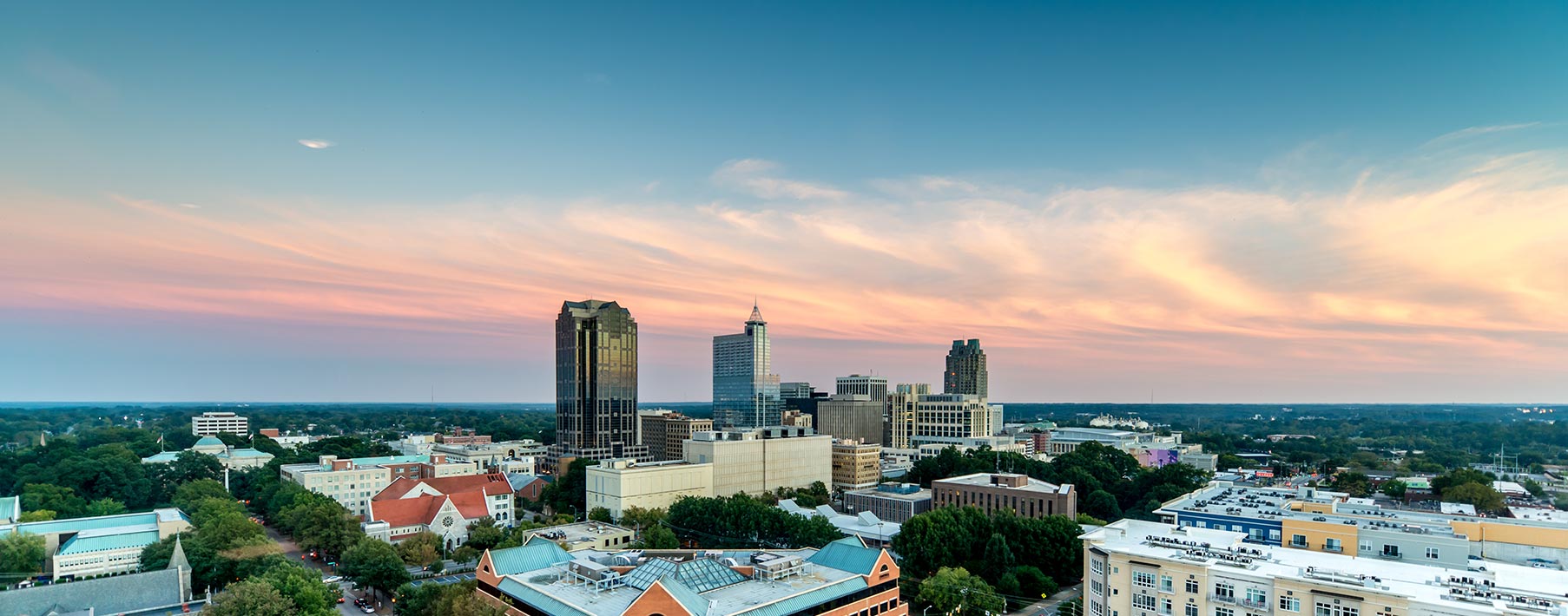
Home Insurance in Raleigh
A strong storm could arrive suddenly and cause significant damage. This situation could not only cause mental stress but also financial hardship. While purchasing a policy could protect you from covered events, it's important to consider whether your home insurance policy in Raleigh is sufficient to cover potential damages.
Raleigh homes face risks such as heavy rain, wind, and rising property values. Insurance costs vary depending on where you live and additional factors. You may want to compare homeowner insurance in Raleigh and carefully review coverage.
How much is the average homeowners insurance cost in Raleigh?
The average annual cost of homeowners insurance in Raleigh, NC, is around $2,540 [1] a year, which is slightly above the national average of $2,110 [2] a year.
Curious about North Carolina’s average home insurance costs over the past five years? The table below shows statewide yearly averages, not specific to Raleigh or any other city.
Keep in mind, these are statewide figures. Your rate might vary based on where you live. Factors like home value, local weather, and population could affect your premium.
Year | Average Annual Premium [3] |
|---|---|
2025 | $2,220 |
2024 | $4,031 |
2023 | $1,992 |
2022 | $2,603 |
2021 | $2,259 |
What factors typically influence home insurance rate?
Several factors related to your home and personal history could impact the amount you pay for home insurance in Raleigh. Here are a few common factors insurance companies often consider:
- Location: Where your home is located is one of the biggest influences on your insurance cost. If you live in an area that's prone to natural disasters like floods, or one with a higher crime rate, you could expect to pay more for coverage in Raleigh.
- Age and condition of your home: Many homes in historic neighborhoods like Oakwood or Mordecai may be older and have original plumbing, roofing, or electrical systems, which could raise your premium. Insurers may consider these homes a higher risk due to potential repair and maintenance issues.
- Home value: Your home's value matters because it determines how much it would cost to rebuild if it's completely damaged. Insurance providers often check the home's purchase price and appraisal to set coverage limits.
- Home features: Certain features make your house riskier to insure. For example, if you have a swimming pool or trampoline, your premium will likely be higher due to the increased risk of injury. Outdated electrical, plumbing, or heating systems could also raise your rate because they're more likely to cause damage.
- Claims history: A clean claims history could save you money. Insurers reward customers who haven't filed many claims, often with discounts. On the flip side, having multiple past claims could lead to higher rates. Many home insurance companies in NC use a CLUE report to check your home and auto claims from the last seven years.
- Coverage amount: The coverage amount you choose could also affect your premium. If you want a higher coverage limit to fully protect your home and belongings, you could pay more. However, this additional cost gives you peace of mind that you're better protected in case of a total loss.
Common insurance discounts in Raleigh
Many insurers in Raleigh offer discounts that could help lower your home insurance bill. Here are some common ones:
- Multi-policy discount: If your insurance company provides more than just homeowners insurance, like auto or renters insurance, you could save by bundling. Buying multiple policies from the same company usually earns you a multi-policy discount.
- Loyalty discount: Some insurance carriers reward homeowners who stay with them for a long period of time. The longer you stick with them, the more you might save. However, note that loyalty doesn't always mean the best deal. It's better to compare Raleigh homeowners insurance costs every year to make sure you’re still getting the best price.
- Advance quote discount: Often, homeowners in Raleigh could get a discount if they plan ahead. Many insurance companies may reduce your premium if you request home insurance quotes in Raleigh, NC one or two weeks before you need the policy to start. This is known as an advance quote discount, and it's an easy way to save.
- New home discount: If your home was built recently, you might qualify for a new home discount. Newer homes are usually built to modern safety codes, which makes them less likely to have costly damage. Most insurers consider a home "new" if it's less than 10 years old.
- Green home discount: Eco-friendly houses could also qualify for savings. If your home or property has Energy Star-rated appliances, is LEED-certified, or includes other sustainable features, you might earn a green home discount. These upgrades not only help the planet, but they could also reduce your insurance premiums.
Not all insurers offer the same savings, and some may even require specific upgrades to qualify. Always check with your provider to determine which discounts apply in your case.
What does home insurance in Raleigh typically cover?
Home insurance in Raleigh, NC, typically covers your home's structure, personal belongings, and liability risks.
- Dwelling coverage: Dwelling coverage is the core of your home insurance policy. It pays to repair, rebuild, or replace your home if it's damaged by a covered loss. This might include things like fire, vandalism, theft, or severe weather (such as wind, hail, or lightning). It could also cover damage caused by outside forces, such as a falling tree branch.
- Personal property coverage: This part of your policy covers personal belongings inside your home. It can include furniture, clothing, appliances, and your heating or cooling systems. If you own expensive items such as jewelry, fine art, or collectibles, you might need to purchase extra coverage to fully protect them.
- Other structures: Detached structures on your property – like a garage, shed, barn, outdoor fireplace, fence, swing set, or wall – are often also covered. Recreational items, such as trampolines or swimming pools, might also be included. However, because they pose a higher risk, you might need additional liability coverage.
- Loss of use: If your home becomes unlivable due to a covered event, loss of use coverage could help pay for temporary living expenses. This could include hotel stays, restaurant meals, or parking fees. Keep in mind that policies have set limits and timeframes, so check your policy details to know what's covered.
- Personal liability coverage: Liability coverage helps protect you financially if someone is injured on your property and decides to sue. It could help pay for legal costs, settlements, and medical expenses.
Additional Raleigh insurance coverage options
Standard coverage could be a good start; however, there are gaps you might want to fill, especially in a city that experiences a range of weather conditions.
Here are a few add-ons you might want to consider:
- Flood insurance: If you're near a floodplain or low-lying area, you may want to look into a separate flood insurance policy (available through FEMA or private providers).
- Sewer or water backup: This add-on coverage protects you if sewage or water backs up into your home or if your sump pump overflows. It could help cover the cost of cleaning up and repairing damage, including repairs to the sewer line within your property boundaries.
- Personal property insurance: provides additional coverage for valuable items, such as jewelry, collectibles, and artwork, that exceed standard policy limits. It can cover losses from theft, including high-value items that exceed standard policy limits.
- Extended replacement cost: This coverage is helpful if rebuilding your home costs more than expected. With rising labor and material costs, this coverage helps manage out-of-pocket expenses.
- Earthquake coverage: Although less common, this coverage is available for those seeking broader protection against natural disasters.
- Identity theft protection: This optional coverage could help protect your identity by providing monitoring services and support with restoration efforts after a breach.
What Raleigh residents need to know
Raleigh is a rapidly growing city with a mix of new developments and historic homes. While it boasts a strong housing market, it also presents specific risks that might affect homeowners' insurance.
Homeowners in Raleigh should:
- Don't under-insure your home: With rising construction costs, ensure your policy's dwelling limit reflects today's rebuilding rates, not last year's market value.
- Schedule high-value items: Items such as heirloom jewelry, camera equipment, or vintage collectibles might need separate scheduling to be fully covered.
- Check your wind/hail deductible: In NC, some policies split wind and hail into a separate deductible. Know what yours is before storm season.
- Struggling to find coverage: The NCJUA could help if your home is considered high-risk and private insurers won't cover it.
Tips to lower your Raleigh home insurance premium
Lowering your home insurance cost in Raleigh doesn't always mean cutting coverage. Small changes could lead to long-term savings.
Try these actionable strategies:
- Perform regular maintenance: A home that's in good shape is less likely to have claims, and that can help keep your premiums in check. Simple fixes, like sealing foundation cracks, cleaning gutters, or replacing old pipes, show your insurance company that you're proactive.
- Don't just auto-renew; shop around: It's easy to let your policy auto-renew every year, but that could cost you. Instead, obtain at least three quotes when your renewal date approaches. Different insurers weigh things such as Raleigh ZIP codes, proximity to a fire station, or your home's age in different ways, so shopping around could reveal a lower rate for the same (or better) coverage.
- Skip small claims when you could: Yes, home insurance could help, but not every problem needs to be filed. If your fence gets damaged in a windstorm or a window breaks during a backyard soccer match, it might be cheaper in the long run to pay out of pocket. Filing multiple small claims could flag you as a higher risk, which might lead to premium increases or even non-renewal. Save your coverage for the bigger stuff, like a kitchen fire or severe water damage, and handle the little things on your own when possible.
Looking for homeowners insurance in a different state?
Want coverage outside North Carolina? Use the map below to explore home insurance options in other states. Click any state to get started.
Still have questions?
Interested in learning more about living and owning a home in Raleigh? Here are some frequently asked questions that help you get clearer answers.
How much is the property tax in Raleigh?
Property tax in Raleigh varies depending on your home's value and location. On average, the rate is around 1.10% of the assessed property value. Please note that this amount might vary depending on local tax rates and any applicable exemptions for which you might qualify.
What salary do you need to live comfortably in Raleigh?
A single adult would need an average salary of about $102,752 to live comfortably in Raleigh. This estimate considers expenses such as housing, utilities, food, transportation, and healthcare. It's important to note that individual circumstances and lifestyle choices affect this figure.
Sources
1 Information from NerdWallet.
2 Information from NerdWallet.
3 Information from Quote Wizard, Superior Insurance, MoneyGeek, and Insurance.com.
This article is for informational purposes only and was compiled from sources not affiliated with Hippo. While we believe this information to be reliable, we do not guarantee its accuracy or completeness. For any insurance-related decision, please consult your licensed insurance producer.



